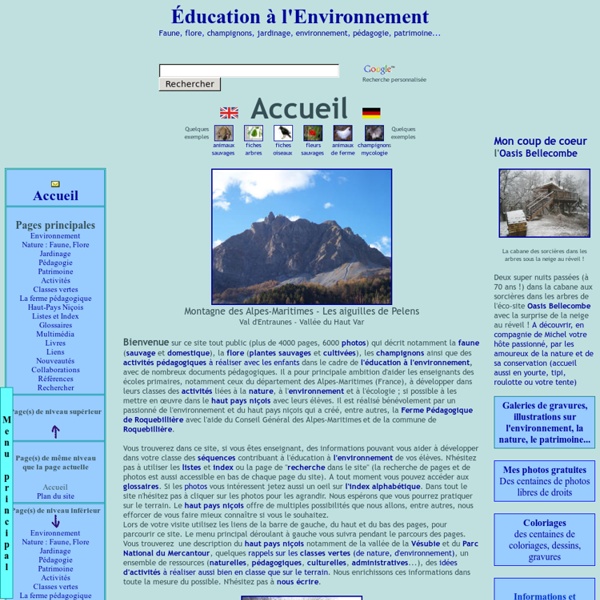



Le Règne animal, classification des animaux : espèces, familles, ordres, classes, embranchements Classification des animaux(France) Tableau complet pour la France sans liens Tableau avec liens pour les espèces traitées dans le site L'homme donna des noms à tous les bestiaux et à toutes les bêtes sauvages." Ainsi, nous dit la Bible, Adam prit-il symboliquement possession du monde. Comme le "premier homme" mythique, le zoologue se donna d'abord pour mission de répertorier le monde vivant, son domaine. L'espèce, c'est un groupe d'animaux ayant des caractères communs et capables d'engendrer des descendants féconds. Les grandes subdivisions de la classificationLe règne animal est divisé en embranchements : vertébrés, mollusques, arthropodes, etc. EMBRANCHEMENT : arthropodes CLASSE : insectes ORDRE : coléoptères FAMILLE : scarabéidés GENRE : melolontha ESPÈCE : melolontha En réalité, il existe bien d'autres divisions intermédiaires qui permettent une plus grande précision mais ne simplifient pas les choses (super-classes, sous-classes, infraclasses, etc.). Règne animal
L'étrange silence des abeilles Les oiseaux Nature et jardin bio Cours universitaires Filières universitaires Choisissez votre formation ! Si vous possédez des cours, n'hésitez pas à partager ! Incluant les formations suivantes :Licence de droitLicence de sociologieLicence d'administration économique et sociale (AES)Licence d'économie-gestionMaster de comptabilité, contrôle, audit (CCA) Incluant les formations suivantes :Licence en langues étrangères appliquées (LEA)Licence en langues, littératures et civilisations étrangères (LLCE)Licence information-communication Incluant les formations suivantes :Licence de sciences de la vieLicence de chimieLicence de sciences physiques Incluant les formations suivantes :Licence de psychologieLicence d'histoireLicence de philosophieLicence de géographie
Boy discovers microbe that eats plastic It's not your average science fair when the 16-year-old winner manages to solve a global waste crisis. But such was the case at last May's Canada-Wide Science Fair in Ottawa, Ontario, where Daniel Burd, a high school student at Waterloo Collegiate Institute, presented his research on microorganisms that can rapidly biodegrade plastic. Daniel had a thought it seems even the most esteemed PhDs hadn't considered. Plastic, one of the most indestructible of manufactured materials, does in fact eventually decompose. It takes 1,000 years but decompose it does, which means there must be microorganisms out there to do the decomposing. Editor's note: There are two high school students who have discovered plastic-consuming microorganisms. Could those microorganisms be bred to do the job faster? The preliminary results were encouraging, so he kept at it, selecting out the most effective strains and interbreeding them.
Michel Foucault - Archives Einstein was right - honey bee collapse threatens global food security The agri-business lender Rabobank said the numbers of US bee colonies failing to survive each winter has risen to 30pc to 35pc from an historical norm of 10pc. The rate is 20pc or higher in much of Europe, and the same pattern is emerging in Latin America and Asia. Albert Einstein, who liked to make bold claims (often wrong), famously said that "if the bee disappeared off the surface of the globe, man would have only four years to live". Such "apocalyptic scenarios" are overblown, said Rabobank. However, animal pollination is essential for nuts, melons and berries, and plays varying roles in citrus fruits, apples, onions, broccoli, cabbage, sprouts, courgettes, peppers, aubergines, avocados, cucumbers, coconuts, tomatoes and broad beans, as well as coffee and cocoa. This is the fastest growing and most valuable part of the global farm economy. The reservoir of bees is dwindling to the point where ratios are dangerously out of kilter, with the US reaching the "most extreme" imbalance.
Régime alimentaire Un article de Wikipédia, l'encyclopédie libre. Cet article concerne l'alimentation des animaux. Pour les régimes alimentaires d'ordre culturel pratiqués par l'Homme, voir pratique alimentaire. Pour les régimes visant à perdre du poids, voir régime amaigrissant. Un régime alimentaire définit la façon dont un organisme se nourrit. Certaines espèces animales ont des régimes alimentaires différents à l'état de larve (ou de jeune) et d'adulte (Ex : têtard herbivore ou détritivore, et grenouille ou crapaud carnivore, perdreaux insectivores et perdrix adultes granivores). Alimentation variée[modifier | modifier le code] Omnivore, qui mange de tout, qui a la capacité de se nourrir d'aliments d'origines végétales ou animales. Alimentation carnée[modifier | modifier le code] Alimentation lactée[modifier | modifier le code] Alimentation végétale[modifier | modifier le code] Autres[modifier | modifier le code] Voir aussi[modifier | modifier le code]
Bees Solve Hard Computing Problems Faster Than Supercomputers We already know bees are pretty good at facial recognition, and researchers have shown they can also be effective air-quality monitors. Here's one more reason to keep them around: They're smarter than computers. Bumblebees can solve the classic "traveling salesman" problem, which keeps supercomputers busy for days. They learn to fly the shortest possible route between flowers even if they find the flowers in a different order, according to a new British study. The traveling salesman problem is an (read: very hard) problem in computer science; it involves finding the shortest possible route between cities, visiting each city only once. Bees are the first animals to figure this out, according to Queen Mary University of London researchers. Bees need lots of energy to fly, so they seek the most efficient route among networks of hundreds of flowers. This is no small feat, especially considering bee brains are about as big as a microdot.
Babel Patrimoine de France